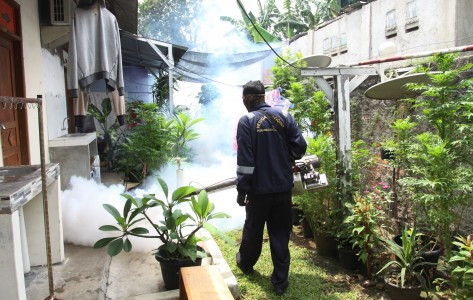Popular Reads
Top Results
Can't find what you're looking for?
View all search resultsPopular Reads
Top Results
Can't find what you're looking for?
View all search resultsFogging ineffective in eradicating mosquitoes, says Depok mayor
Fogging is ineffective in eradicating virus-transmitting Aedes aegypti mosquitoes and their larvae because it only attacks adult mosquitoes.
Change text size
Gift Premium Articles
to Anyone
T
he Depok administration in West Java has opted to apply an eradication mosquito breeding site movement (Gertak PSN) in 11 subdistricts in the city in an attempt to eliminate places where dengue-causing mosquitoes breed.
Idris said the program had been carried out since early February and the results were already evident, as could be seen in the declining number of dengue patients at Depok General Hospital.
"The hospital previously treated 200 patients, but now there's only 21," he said as quoted by wartakota.tribunnews.com.
Depok Major Mohammad Idris said he believed intensified spraying of insecticide was ineffective in killing virus-transmitting Aedes aegypti mosquitoes and their larvae because it only attacked adult mosquitoes.
"Residents believe that fogging is effective, but it actually only intoxicates mosquitoes," Idris said as quoted by tempo.co on Thursday.
Budi Haryanto, a climate change and environmental health researcher at the University of Indonesia, said fogging was the best solution for areas with dengue cases, as it could eradicate adult mosquitoes even though it would not kill the larvae.
“Proper home prevention and fogging would be effective, but both of them need a correct procedure,” he said.
He added that fogging had long been done improperly because of a lack of awareness on the importance of fogging, as well as homeowners’ reluctance to allow workers to spray inside their houses.
Fogging, he said, should be done no later than three days after someone has tested positive for dengue fever.
Another issue is that fogging does not always reach the distance a mosquito can fly, about 200 meters, from the location of the last person it had bitten. (ggq)










